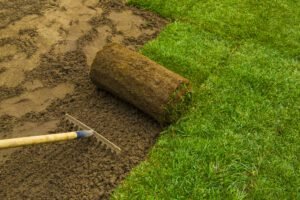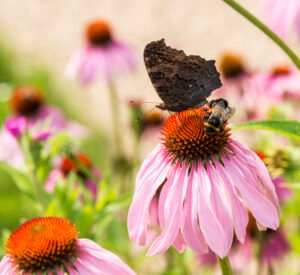In this article, we will delve into the various ways mulching improves soil health and explore its benefits in landscaping. We’ll cover the fundamentals of mulching, discuss its multifaceted advantages, and provide guidance on effectively implementing it in your landscaping routine. Whether you’re new to the concept or looking to refine your approach, this guide will equip you with the knowledge needed to make the most of mulching.
What is Mulching?
At its simplest, mulching involves covering the soil with a protective layer of material. This layer can be made from organic materials like wood chips, straw, grass clippings, and leaves, or inorganic materials like plastic sheeting and gravel. The primary purpose of mulching is to improve the quality and health of the soil, though it also offers several aesthetic and practical benefits.
Mulching serves as a barrier against environmental factors that can degrade soil quality, such as wind and water erosion. By choosing the right type of mulch, you can tailor its benefits to suit your gardening needs.
The Advantages of Mulching
Soil Moisture Retention
One of the most significant advantages of mulching is its ability to retain soil moisture. By covering the soil, mulch reduces evaporation, ensuring your plants have a steady water supply. This is particularly beneficial during hot, dry spells when water conservation becomes crucial.
Temperature Regulation
Mulch acts as an insulator, helping to keep the soil temperature consistent. In the summer, it prevents the soil from becoming too hot, and in the winter, it keeps the soil from freezing. This temperature regulation is vital for protecting plant roots and ensuring their healthy growth. By moderating temperature extremes, mulch creates a more stable environment for microorganisms and plant roots, which can be sensitive to abrupt changes.
Weed Suppression
Weeds are not just an eyesore; they compete with your plants for nutrients and water. Mulching creates a barrier that makes it difficult for weeds to take root and grow. By suppressing weed growth, mulch helps maintain the beauty of your landscaping and reduces the need for chemical weed killers. This natural approach to weed control is not only eco-friendly but also supports a healthier garden ecosystem.
Nutrient Enrichment
As organic mulch breaks down, it enriches the soil by adding essential nutrients. This process improves soil fertility, promoting robust plant growth. Over time, regular mulching can transform poor soil into a nutrient-rich environment that supports a diverse range of plant life. The decomposition of organic mulch releases nutrients gradually, providing a continuous supply to plants throughout the growing season.
Mulching Benefits in Landscaping

Enhancing Aesthetic Appeal
Mulch can significantly enhance the aesthetic appeal of your garden or front yard landscaping. Available in various colors and textures, mulch can complement the design of your outdoor spaces, creating a polished and professional look. By choosing a mulch that matches or contrasts with your plantings, you can highlight specific areas of your garden and create a cohesive visual theme.
Erosion Control
Erosion can be a significant issue, especially in areas with heavy rainfall. Mulch helps to hold the soil in place, reducing erosion and preventing the loss of valuable topsoil. This is particularly important for maintaining the integrity of your landscaping. By stabilizing the soil, mulch prevents the displacement of nutrients and provides a more secure foundation for plants.
Encouraging Beneficial Organisms
Mulching encourages the presence of beneficial organisms like earthworms and soil microbes. These organisms are crucial to breaking down organic matter, aerating the soil, and enhancing nutrient availability. A thriving community of beneficial organisms is a clear indicator of healthy soil. By fostering this biodiversity, mulch contributes to a self-sustaining garden ecosystem.
These organisms also help in the natural decomposition of mulch, creating a cycle of nutrient replenishment. This dynamic interaction between mulch and soil life enhances soil health over time, leading to more robust plant growth and increased resilience against pests and diseases.
Cost-Effective Solution
Incorporating mulch into your landscaping is a cost-effective solution that offers long-term benefits. While there is an initial investment in materials, the ongoing benefits of improved soil health, reduced water usage, and decreased need for fertilizers and herbicides make it a worthwhile investment for any lawn service or homeowner. Over time, the savings in water bills, reduced need for chemical inputs, and lower maintenance costs contribute to the overall value of mulching.
Choosing the Right Mulch
Organic vs. Inorganic Mulch
When selecting mulch, you have the option of organic or inorganic materials. Organic mulches, like bark, compost, and straw, decompose over time, enriching the soil. Inorganic mulches, such as rocks and plastic, do not decompose and are primarily used for decorative purposes and long-term weed suppression. Each type of mulch has its own set of benefits and considerations, depending on your landscaping goals.
Organic mulches are ideal for gardeners looking to improve soil health and support plant growth. Inorganic mulches may be more suitable for those seeking minimal maintenance and long-lasting coverage. Understanding the specific needs of your garden will help you make the right choice for your landscape.
Considerations for Your Landscape
The type of mulch you choose will depend on your specific landscaping needs and preferences. Consider factors such as the climate, the types of plants in your garden, and the overall design of your outdoor space. Consulting with a lawn landscaping service can provide valuable insights into the best mulch for your situation.
Implementing Mulching in Your Landscaping Routine

Preparing the Area
Before applying mulch, prepare the area by removing existing weeds and debris. This ensures the mulch can effectively suppress new weed growth and provide a clean, uniform appearance. Proper preparation also involves loosening the soil to improve water penetration and root growth, setting the stage for optimal plant health.
Clearing the area of debris and weeds not only makes it easier to apply mulch evenly but also helps in preventing the spread of pests and diseases. This preparatory step is crucial for achieving the full range of benefits that mulching offers.
Application Techniques
When applying mulch, aim for a layer about 2-4 inches thick. Too little mulch won’t provide the desired benefits, while too much can suffocate plant roots and hinder water penetration. Spread the mulch evenly, ensuring it does not touch the stems or trunks of plants to prevent rot. The even distribution ensures that the mulch performs its role effectively across the entire garden bed.
Maintenance and Renewal
Mulch will break down and decompose over time, requiring renewal to maintain its benefits. Regularly check the thickness of your mulch layer and replenish as needed to ensure continued moisture retention, weed suppression, and nutrient enrichment. This ongoing maintenance is key to sustaining the health and appearance of your landscape.
Periodic renewal also provides an opportunity to reassess your mulch choice and make adjustments based on the changing needs of your garden. By staying attentive to the condition of your mulch, you can ensure that your landscaping remains vibrant and well-maintained.
Conclusion
Mulching is a simple yet effective practice that offers a multitude of benefits for soil health and landscaping. Whether you’re a homeowner looking to enhance your garden or a professional in the lawn service industry, incorporating mulching into your routine can lead to healthier plants, reduced maintenance, and a more beautiful outdoor space. By understanding and utilizing the advantages of mulching, you can achieve a thriving and sustainable landscape that enhances the appeal and value of your property. For expert lawn landscaping services in Florida, contact our team at Copperhead Property Maintenance Services today!







